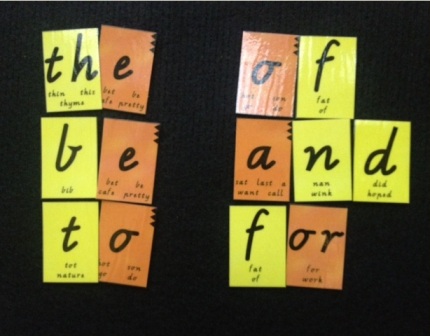Teach 100 first spellings, not 100 first words
2 Replies
Some days I think of a really good title for a blog post, but it's just stupidly long, and if I used it, the post would sink like a stone in search engines and nobody would read it.
Today is one of those days, and the title I have sensibly not used is:
Why on earth would you teach children 100 first words, when you could teach them 100 first spellings, which would give them the power to read and spell thousands of words?
Children starting school are often taught to read and write "100 first words" – words that come up frequently in books and/or the English language more generally.
There are various 100 first words lists, but just for example, 20 words that seem to make it onto all of them include:
|
the be to of and |
a in that have I |
it for not on with |
he as you do at |
To make these 20 words, you need the following spellings:
Vowels: a, e, i, o, or, ou.
Consonants: b, d, f, h, n, s, t, th, ve, w, y.
17 spellings.
Why would you teach concepts that are bulky and redundant, when you could teach compact, reusable concepts? We wouldn't do it in maths, or science, so why do we do it in literacy?
Working through the above 20-word list, writing out the spellings required, you only get as far as "that" and you realise you don't need any extra spellings.
You can just recycle the "th" you met in "the", the "a" you met in "and" and the "t" you met in "to".
It happens again on "not". No extra spelling required. You can just use the "n" from "in", the "o" from "of" and the "t from "to", "that" and "it".
It happens again with "on" and "he" and "at".
If you learn the spellings of the words "do" and "to", you don't need an extra vowel letter to make "of", "not" and "on".
You just need to know that this spelling has more than one sound, depending what sort of word it's in.
There's "o" as in "not" (with a consonant after it), "o" as in "to", and as you meet more words you'll discover that there's also "o" as in "go", and "o" as in "won".
These words can be learnt in groups so that their patterns are clear and understood, and nobody trips over the variations.
Is this too hard for little children? I don't think so, and the idea that they have to swallow hundreds of words holus bolus, not learn to digest them properly, is not supported by the literacy research. In fact, quite the reverse. Digesting words is go, and clear instruction in how to do it properly is absoutely essential for the weakest readers.
So if your child is being sent home with lists of words to swallow whole, please show them how to digest them properly, and how to use their components in many, many, many other words.
Don't risk your child getting the idea (in the absence of more accurate information) that written English has a separate symbol for each word, but not even supposedly "logographic" languages like Chinese really have this, or nobody would be able to learn them. Our writing system is based on representations of the sounds we say, and it's complicated but eminently learnable.
If you need a cheap ($10), useful , assemble-yourself tool to help you with this, try my movable alphabet, which contains 100 spellings used in one-syllable words. Get a roll of magnetic tape from the stationer, and hey presto, fridge magnets. Each piece includes little example words, to help you explain authoritatively to your child how many main sounds each spelling represents, and what they are. Click here to see a video demonstration.



What a fantastic idea! My son is 4 and is so interested in words and language and reading. My husband has been teaching him short words but this is so much better an idea! I can't wait to try to see how he takes to it. Thank you!
Thanks to a combination of Twitter and Facebook, I’ve just shared this with a Year 1 mum in England.
Got to love social media when it comes to the rescue like that. Thanks for your clear and kindly free help!